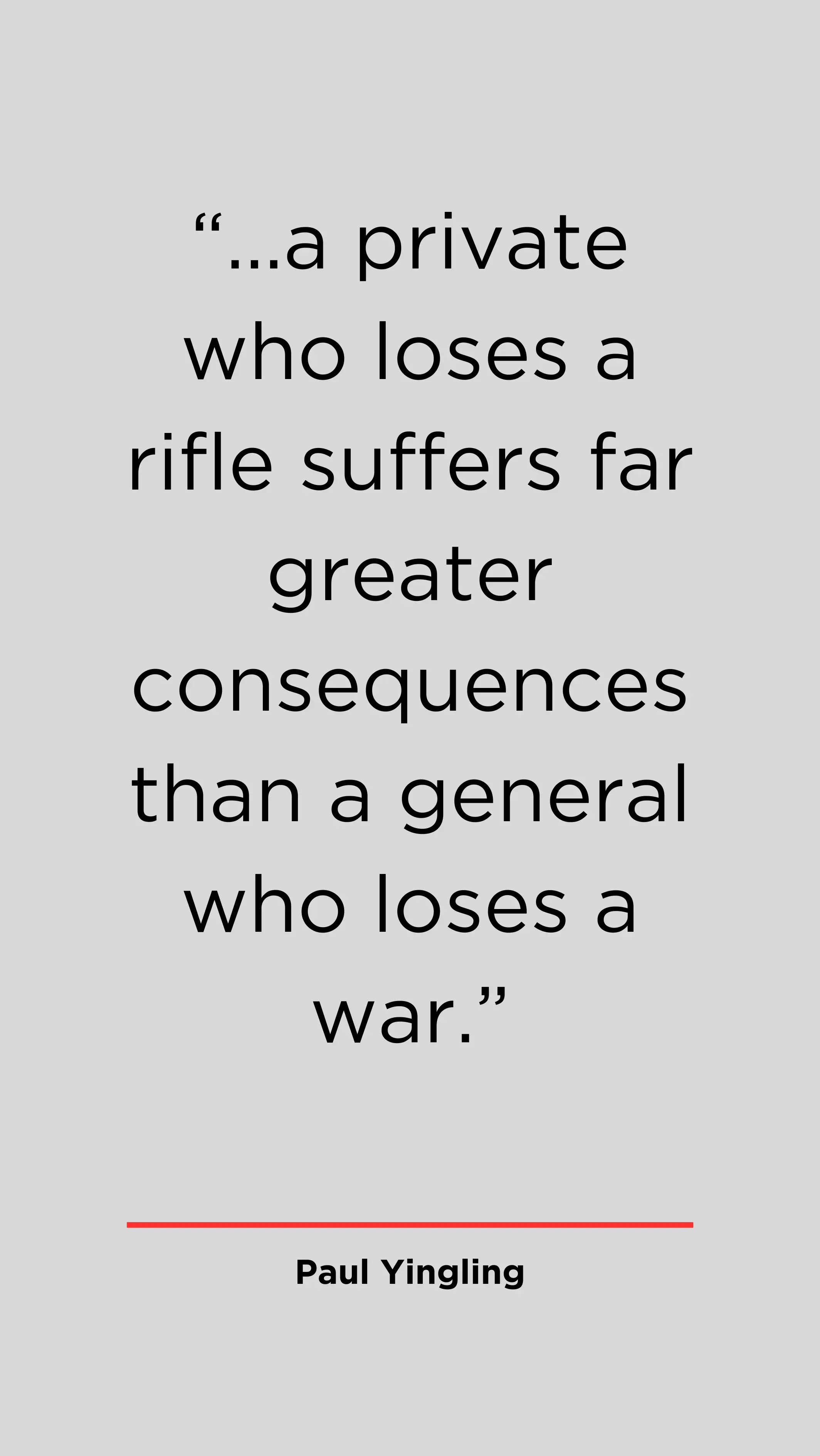Paul Yingling, a U.S. Army officer and strategist, gained prominence for his willingness to challenge established military doctrines and advocate for change within the U.S. military. His contributions to strategic thinking and candid assessments of military leadership have made him a notable figure in contemporary military thought.
Early Military Career and Education
Thomas E. Yingling’s military career commenced with his commissioning as a Second Lieutenant in the U.S. Army. With a commitment to service, Yingling embarked on a path that would see him engage with military strategy and leadership at various levels. His early experiences in the military not only provided the practical groundwork for his career but also laid the foundation for the intellectual and strategic insights he would later contribute to the field. Moreover, these formative years armed him with invaluable skills. Consequently, his military background became a springboard for his future achievements, fostering a unique blend of practical knowledge and theoretical acumen.
Recognizing the importance of a well-rounded education, Yingling pursued advanced studies, obtaining a master’s degree in international relations. This educational background equipped him with a broader understanding of global dynamics, which would prove valuable as he navigated the complex landscape of military strategy. The combination of hands-on experience and academic rigor laid the groundwork for Yingling’s future endeavors, positioning him to make significant contributions to the development and critique of military strategy in the years to come.
Paul Yingling: Iraq War and “A Failure in Generalship”
Paul Yingling gained prominence in 2007 with the publication of his influential essay, “A Failure in Generalship.” This critical piece cogently addressed the shortcomings of the U.S. military’s senior leadership during the Iraq War, meticulously examining the challenges faced on the battlefield. Moreover, it delved into the nuanced aspects of decision-making at the highest levels, highlighting the intricacies that often went unnoticed. Additionally, the article underscored the need for a comprehensive reevaluation of strategic planning and emphasized the imperative of adapting to the dynamic nature of modern warfare. Yingling’s central argument was a pointed critique of the general officers, asserting that they had not effectively adapted to the challenges presented by the conflict. He emphasized the necessity of strategic flexibility and a thorough reevaluation of military doctrine to better align with the evolving nature of warfare.
In “A Failure in Generalship,” Yingling’s candid assessment sparked important conversations within military circles and beyond, prompting a broader examination of leadership and strategy. The essay underscored the significance of constructive criticism and the imperative for military institutions to adapt to contemporary geopolitical realities. Yingling’s bold critique positioned him as a key figure in discussions surrounding military strategy and leadership, influencing subsequent debates on the conduct of U.S. military operations.
Challenging Military Leadership Assumptions
Paul Yingling’s impact on military discourse extended beyond his critique of the Iraq War, as he questioned long-standing assumptions within military leadership. In challenging the status quo, Yingling advocated for a fundamental shift in the officer corps’ mindset, urging a departure from rigid doctrines and a greater emphasis on adaptability. His argument emphasized the need for military leaders to be intellectually rigorous, capable of critical thinking, and willing to reassess strategies in response to the dynamic nature of modern warfare.
Yingling’s call for a more proactive and forward-thinking officer corps resonated with broader discussions about the future of military leadership. By challenging established norms and encouraging a culture of adaptability, he contributed to shaping the narrative around leadership development within military institutions. Yingling’s insights prompted reflection on the evolving demands placed on military leaders in a rapidly changing world, fostering conversations that sought to redefine the principles guiding military strategy and leadership.
Paul Yingling: Congressional Testimony and Advocacy for Change
In addition to his written critiques, Paul Yingling took his advocacy for change in military leadership practices directly to the heart of the U.S. government through congressional testimony. Furthermore, he underscored his concerns during interviews with prominent media outlets. Additionally, Yingling engaged in constructive dialogues with key policymakers, supplementing his efforts to bring about reform. Moreover, he actively participated in panel discussions and conferences to amplify his message and foster a broader understanding of the necessary reforms. Before the U.S. Congress, Yingling provided firsthand insights into the deficiencies he identified within the military leadership structure. His testimony served as a call to action, urging lawmakers to reconsider traditional approaches to military strategy and leadership and to invest in the intellectual and strategic capabilities of the officer corps.
Yingling’s engagement with Congress showcased his commitment to driving systemic change within the military. By participating in the legislative process, he aimed to influence policy decisions and institutional reforms that would address the shortcomings he identified. This dual approach, combining written critiques with direct engagement at the highest levels of government, underscored Yingling’s dedication to reshaping military leadership practices for more effective and responsive armed forces.
Contributions to Strategic Thinking
Paul Yingling’s contributions to contemporary strategic thinking have left a lasting impact on discussions surrounding military doctrines and practices. His critique, “A Failure in Generalship,” sparked conversations within military and academic circles about the need for a more flexible and intellectually engaged officer corps. Yingling’s call for a reassessment of traditional leadership assumptions and a greater emphasis on strategic insight resonated with those seeking a more adaptive approach to the complexities of modern warfare.
Beyond his written critique, Yingling’s advocacy for change and his engagement with Congress showcased a commitment to shaping the future of military leadership. The conversations he initiated have prompted ongoing reflections on how the U.S. military should evolve to meet the challenges of the 21st century. Yingling’s contributions have become integral to the broader discourse on military strategy and leadership. Not only have his insights significantly impacted academic studies, but they have also played a crucial role in driving practical reforms within the armed forces. Moreover, his ideas have resonated across diverse forums, ranging from scholarly conferences to high-level policy discussions. Furthermore, his influence extends beyond the theoretical realm; it has translated into tangible changes in training programs and command structures. Additionally, policymakers have actively sought his input, further solidifying his standing as a thought leader in the field.
Paul Yingling: Mentorship and Educational Leadership
Paul Yingling’s influence extends beyond his written critiques and advocacy efforts; it is also reflected in his roles as a mentor and educational leader. Furthermore, his commitment to fostering the next generation of military leaders is evident through his active engagement in mentorship programs. Additionally, he has served as a guiding force for numerous aspiring leaders, imparting not only his knowledge but also his practical insights gained from years of experience. Serving as a mentor, he has played a crucial role in shaping the intellectual development of military officers, guiding them toward a more critical and strategic mindset. His commitment to fostering a new generation of leaders who question assumptions and adapt to the evolving nature of conflict has contributed to a cultural shift within military education.
In his educational leadership roles, Yingling has likely influenced curriculum development and teaching approaches, emphasizing the importance of strategic thinking and adaptability in military education. By imparting his insights and experiences to the next generation of military leaders, he continues to shape the intellectual landscape of military institutions, promoting a culture of continuous learning and innovation. Through mentorship and educational leadership, Yingling has left a lasting imprint on the mindset and capabilities of those who will lead the U.S. military into the future.

Continued Engagement in Military Discourse
Paul Yingling’s enduring impact on military discourse is evident in his continued engagement and advocacy for a more innovative and adaptable military culture. Contrary to being a one-time critic, Yingling has consistently and actively contributed to discussions on military strategy, doctrine, and leadership. Furthermore, he has not only provided insightful critiques but has also actively engaged in proposing alternative solutions. In addition, his ongoing commitment to these conversations underscores his dedication to fostering a deeper understanding of the complex dynamics within the realm of military affairs. His ongoing participation in these conversations signals a commitment to instigating change and promoting a mindset that addresses contemporary security challenges with agility and foresight.
Yingling’s dedication to fostering a military culture that values innovation and adaptability goes beyond critiques; he actively participates in shaping the narrative around the future of the U.S. military. Whether through writings, public discussions, or direct engagements with military institutions, his voice remains not only prominent but also influential. Through these various channels, he consistently urges for a strategic shift that not only acknowledges but actively prepares the armed forces to deftly navigate the complexities of modern warfare successfully. Furthermore, by participating in diverse platforms, he advocates for a nuanced approach, emphasizing the need for adaptability and innovation. In doing so, he not only provides insight but also cultivates a broader understanding of the evolving landscape of military strategy.











